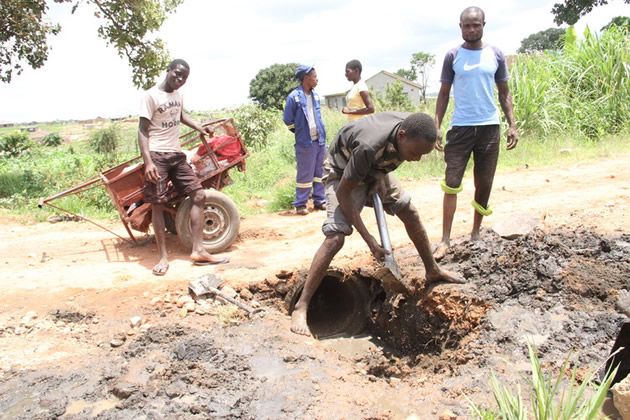Cleaning the fine mess of Caledonia

Sydney Kawadza Senior Features Writer
Caledonia, a sprawling settlement east of Harare on a farm of the same name, has been synonymous with chaos, poor sanitation and irregular settlement.
At the turn of the century, and ever since, people have been flocking to the area. And when the displaced people of Churu and Porta farms also joined the exodus, Caledonia descended into chaos.
People settled themselves in their thousands and without any pretence to order, sanity and basic amenities.
Many residents of Caledonia are poor — the poorest of the poor.
All they ever needed was a place to call home.
And in the confusion, certain unscrupulous individuals arrogated themselves power to sell land and settle people without regard to the basic and legal frameworks and planning requirements.
To date, Caledonia Farm has 30 000 stands allocated through various institutions, co-operatives and groups.
However, only 7 000 stands have been properly allocated amid calls for the regularisation of residents.
The issue of infrastructure and social amenities is glaring.
Residents who applied and were allocated stands are disillusioned by the lack of development in the area.
Caledonia Farm has no roads, electricity, clinics, schools, water and sewer reticulation facilities and other essential social amenities for proper human habitation.
Caledonia Farm has 20 phases of which one to three have been regularised.
The rest of Caledonia Farm has been turned into an illegal settlement similar to Epworth.
Residents interviewed pointed out various reasons that have stalled development in their area.
Mrs Esnath Chalesa said authorities have neglected the residents since they moved into the area.
“Some of the residents started staying here around 1993 and nothing has been done to improve their living conditions,” she said.
Mrs Chalesa said Government should have moved in to regularise their stay a long time ago to avert a potentially hazardous situation.
“We need roads, clinics, water electricity among other amenities, but this has been a pipe dream since people lost their money to unscrupulous housing co-operatives and other land dealers,” she added.
Some enterprising youths in Phase 11 have taken the initiative to rehabilitate the roads in their area. Thirty-three year-old Tapiwa Chando leads a group of youths to construct bridges in his area saying they could not stand and watch while authorities are not taking an active role in developing the area.
“I have a car and most of us with vehicles are incurring huge expenses in fixing and maintaining our vehicles because of the poor roads so instead of waiting for authorities to fix things we will go it alone,” he said.
The five man squad is putting final touches to a makeshift bridge linking their area to Phase 10.
“There are people who would want to invest and develop this area but with these roads no one would want to be associated with this,” he said.
Chando urged council to start working on the roads first before other amenities.
“We know of stand owners who have decided to abandon their stands because of the bad roads. We have boreholes for water and we can use solar for lighting but the roads are important for development in the area,” Chando said.
However, Government through the Urban Development Corporation and the City of Harare have advertised tenders for the construction of eight bridges and a 4,2-kilometre road that would link Caledonia to Tafara/Mabvuku, Ruwa and surrounding areas.
Residents have heard of the latest developments but are not that excited.
Elisha Chirima said residents welcome the stance taken by Government to improve their area.
“If they can build the road and work on the bridges we welcome the development but we would be happy if we see the actual work on the ground,” he said.
Chirima believes Government should also look at such amenities such as schools and clinics.
“Our children walk long distances to Mabvuku and Tafara so we, the authorities would look at the construction of schools and clinics in our area,” he said.
Caledonia Management Committee chairman Mr Percy Toriro acknowledged the challenges that have been faced in the settlement.
“We conducted some investigations and discovered that 80 percent of the development were illegal and of the 30 000 stands in the area only 7 000 had been approved,” he said.
Mr Toriro said his committee, which is involved in the regularisation of stands in Caledonia was seized with the task of bringing sanity to Caledonia.
“We noticed during our investigations that there were financial irregularities in that everyone looking for quick money would identify a piece of land and start collecting money from desperate home seekers.”
He said there were residents who have been diligently paying their contributions but there was no development in the area.
“We have moved in after our investigations to start the re-planning exercise in the whole area because people were allocated land where there are no plans but as we speak all the 20 phases at Caledonia have been approved,” he said.
Mr Toriro also acknowledged the need for schools, clinics, shopping centres and roads.
“The programme we have embarked on would see us moving people who had been settled on sites reserved for such amenities such as roads, schools and shopping centres,” he said.
The Caledonia Management Committee has set four targets that should be achieved in the first six months of the year.
Firstly, the Committee wants to see through the completion of the 4,2-kilometre road linking Caledonia to Tafara, Damofalls and Ruwa.
“We should have the contractor on site this month because we believe the opening of gravel roads is not a solution and this road will link Caledonia to its surrounding areas,” he said.
The second target set by the committee is the construction of the eight bridges that would link the 20 phases.
“There is no connectivity among the phases so the bridges would link the phases up to Acturus Road,” said Mr Toriro.
Thirdly, the committee is engaging surveyors for the 23 000 stands and this project is expected to last up to March this year.
“The fourth target seeks to ensure the relocation of who were settled on land reserved for schools, roads and shopping centres,” he said.
Mr Toriro added: “We have taken a people centred approach because all the people on illegal land will be moved to approved land.”
He however, said the committee would not tolerate people who are still selling land to unsuspecting Zimbabweans.
“We would make these cases criminal and report them to the police. We aim to put long lasting infrastructure on the settlement,” he said.
Caledonia started as a low income housing project for people moving from illegal settlements such as Porta, Churu and other farms.
The settlement however, attracted several other home seekers who also fell victim to unscrupulous land barons.
“People were fleeced of millions of dollars without getting any rewards but Government has brought security of tenure, order and infrastructure to Caledonia and the ground has been laid for proper settlement of residents,” Mr Toriro said.
He however, added that the scramble for stands was not peculiar to Caledonia Farm but was evident in most peri-urban areas across Zimbabwe.
“Government needs to maintain a strong regulatory framework for land in urban areas in Zimbabwe. Developments in peri-urban areas are targets for cheap land and there is need to keep an eagle eye on such activities,” he said.
In Caledonia, Government has drilled 22 boreholes at different points and there are hopes to regulate the sewage disposal works.
Civil engineers are working on feasibility studies on the sewer disposal mechanisms.
The Caledonia Management Committee is made up of officials from UDCORP, the Urban State Lands Office under the Ministry of Local Government, Public Works and National Housing and the City of Harare.
- Feedback: [email protected]









Comments